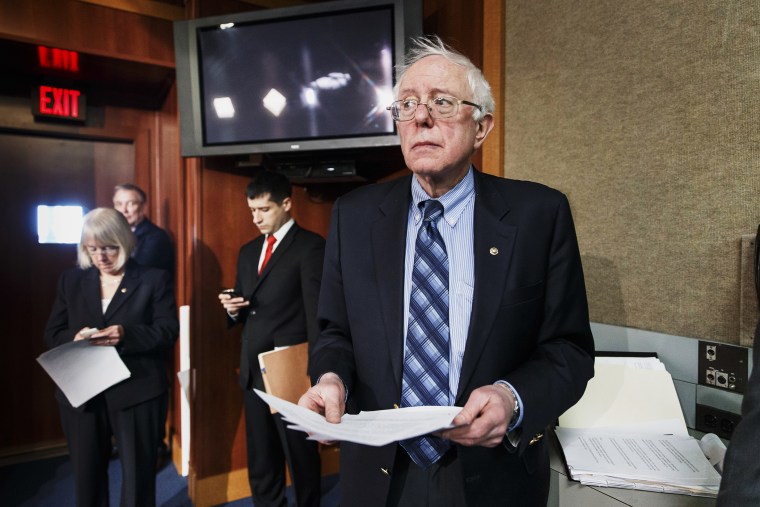As of Thursday, a pending bill to expand veterans' benefits appeared to be just about dead. What had been a bipartisan issue had turned into yet another partisan food fight, with House Republicans rejecting multiple compromise offers and walking away from the negotiating table. The Senate Democratic caucus, led in this fight by Sen. Bernie Sanders (I-Vt.), was apoplectic, blasting House GOP lawmakers for killing legislation that should be approved easily.
If the goal of the Democratic outrage was to force House Republicans to reconsider, the apoplexy worked. GOP lawmakers, reluctant to get blamed for killing another veterans-aid package, were shamed into renewing talks, and last night, negotiators struck a deal.
According to a summary of the agreement obtained by CQ Roll Call, the negotiators agreed to $15 billion in emergency mandatory spending -- $10 billion for a new private care option for veterans and another $5 billion for improvements within the VA, like hiring doctors and nurses and upgrading facilities. That's $5 billion more than Miller offered on Thursday and about $10 billion less than Sanders sought. To qualify for the private care option, veterans would have to be experiencing long wait times or be located more than 40 miles from a VA facility. They would be able to access providers who already participate in Medicare.
Sanders, chairman of the Senate Veterans' Affairs Committee, will reportedly join House Veterans' Affairs Chairman Jeff Miller (R-Fla.) at a Capitol Hill event this afternoon to unveil their compromise.
If the price tag is any indication, Sanders compromised quite a bit -- the Senate bill, which passed in June on a 93-to-3 vote, had a price tag of $35 billion over 10 years. This new agreement with the GOP-led House has reduced the aid package to $15 billion, less than half the original total.
It's worth adding a note of caution: just because the relevant lawmakers agreed to a compromise does not mean that the process is over. Congress will still have to pass the deal and neither chamber will be able to amend the agreement. That said, the odds of success appear high.
So, good news, right? For veterans and their advocates, the announcement is obviously encouraging, but before anyone starts using the "maybe Congress can function effectively after all" talking point, I'd recommend keeping the praise to a minimum.
Let's not forget that when lawmakers first took up the bill in June -- back when VA difficulties were literally front-page news -- Congress appeared to be moving "at warp speed." Very quickly, members in both chambers, eager to appear pro-veteran in an election year, crafted and passed multi-billion-dollar aid bills.
The Senate bill passed with a 93-vote majority. The House version passed unanimously. There was talk that the legislation would be on the president's desk within a week.
Seven weeks later, the bill, after nearly dying, is finally limping towards the finish line.
To be sure, it's a minor miracle when anything passes in this Congress, and I'm not trying to downplay the importance of success, especially on a critical issue like veterans' benefits. But let's not fall into the soft bigotry of low expectations -- this was supposed to be the easiest bill of the year. The fact that it took a lengthy, contentious fight to get anything done isn't evidence of an institution still capable of governing; it's practically evidence of the opposite.
Doing the right thing just shouldn't have been this hard.
